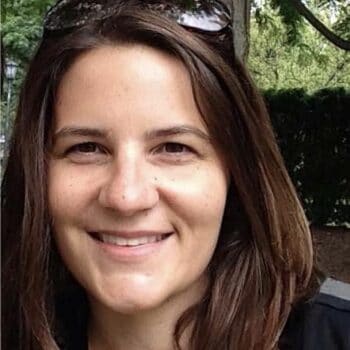Andrea Couture

Writing has turned into so much more than memorializing my dad and documenting his path with Alzheimer’s: It has become a vessel to help others, to share my story and to feel useful in a time when my father’s disease rendered me feeling helpless.
Andrea Couture is the author of “Embracing What Remains,” a memoir about balancing motherhood and daughterhood following her father’s Alzheimer’s diagnosis.
When my father, Richard, was diagnosed at age 67 with Alzheimer’s, I was devastated. I wasn’t sure how I was going to handle his diagnosis or process it at all. He had just retired two years prior from a successful career as a surgeon specializing in burn injuries. I had high hopes for our relationship to grow in his retirement.
Sharing my feelings with my loved ones and close friends wasn’t enough for me to process what was happening. I was raising three children — one born the same year my father was diagnosed — and trying to balance spending time with my parents. I decided to write about how my relationship had changed with my father and the challenges of balancing motherhood, daughterhood, sisterhood and being a wife with an ailing parent — and I have found beauty, sadness, irony and humor as I reflect on this journey.
Since a young age, I have made journaling a habit. Writing has allowed me to express all of my thoughts, worries, triumphs and feelings from the day. I would feel released and ready for a new day. The changes I witnessed in my father, and the relationship between my parents and I, were a constant catalyst for me to write. Journaling about my father throughout his decline over the last five years has been difficult at times. Other times, it has been humbling and inspiring.
My grief, coupled with the awe-inspiring life my father led prior to Alzheimer’s and my desire to grow closer to him, compelled me to write a memoir about our last few years together. My words became sentences that became paragraphs, chapters and eventually an entire book.
As I researched how to write a memoir, I learned that it was beyond just a sharing of journal entries or random memories. Memoir is a specific genre that requires the author to illustrate a transformation that has taken place and how the transformation has unfolded. In my research, I joined online groups, read other memoirs, hired an editor and spent time truly understanding what was expected of me as an author and what my readers may need or want from my story.
I immersed myself in my laptop at times for hours as the memories and words flowed from me. The writing process has proven to be extremely cathartic and transforming for me. It has motivated me to remember times in the past when my dad was what I term the “Old Dad.” While I write, I cry, I laugh, I have “ah-ha” moments and I feel a sense of contentment as I put my words down.
But, writing has turned into so much more than memorializing my dad and documenting his path with Alzheimer’s: It has become a vessel to help others, to share my story and to feel useful in a time when my father’s disease rendered me feeling helpless. My father lost his gift of conversation early on in his disease. His words began to slip away, but in the loss of his voice, I found mine. My writing has opened my eyes to reflection, honesty, understanding and acceptance of a disease that remains a mystery in many ways. Though my father no longer teaches medical students and residents, I felt all along he was teaching me about compassion, but most of all myself. One of my father’s passions in his career was his love for medical education and I felt he was continuing this even in his silence with the way he inspired others to care for him or respond to his increasing dependency.
I realized during this process that my writing has become more than just a habit for me. It feels like a calling. I was a journalism major in college and employed my writing skills over the years but never in the form of a book or for professional gain.
Writing and sharing my writing has allowed me to communicate with others in ways that I may not have otherwise. It was easy to focus on all the negatives that happened with the disease. Being forced to focus on the lessons I learned, ones that might help others, made it all a little less harsh at times. When I felt I was finished writing a chapter, I would share it with my mother. Together we would remember and reflect. When I shared my writing with other family members, they would remark, “Oh I forgot about that,” or “I didn’t realize you felt that way.” It began to open up conversations and thoughtful discussions of our father/grandfather/father in-law both before and during my father’s disease. It would allow someone to share their view or a story with me.
At first, my writing was for myself. Then, I wrote for my family. Then I realized I could share it with people dealing with the same struggles with this disease. It began to feel like my writing had more of just a mission to remember: It became a mission to help my readers. The process of writing made me feel like I was contributing a small part in the fight against this disease, helping others feel less alone. If my writing can offer solace to even one person, then I have succeeded in my mission to share my story.